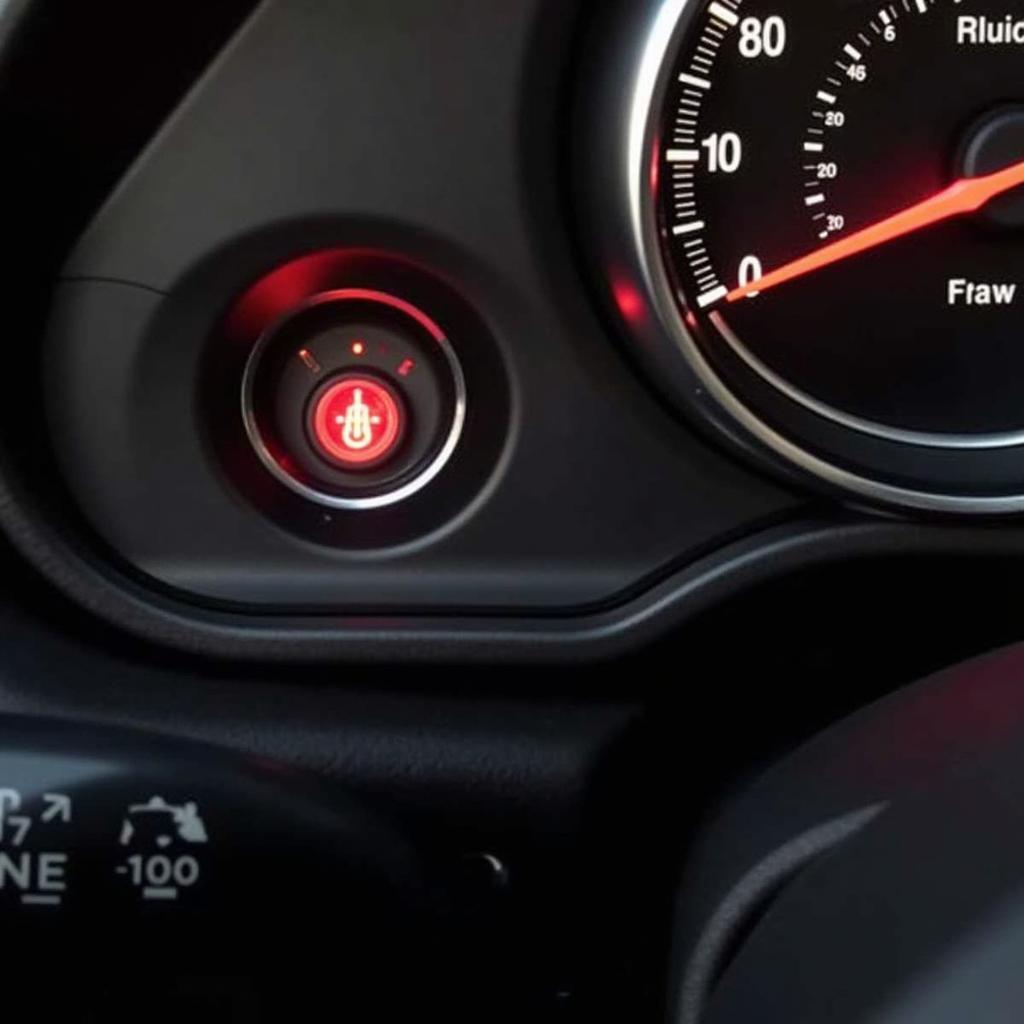That dreaded brake warning light on your Jeep Wrangler dashboard can be a real headache. Whether it’s a steady glow or an intermittent flicker, a brake warning light signals a potential problem with your braking system and requires immediate attention. This article will explore the common causes of a brake warning light in a Jeep Wrangler, guide you through some troubleshooting steps, and discuss solutions, from simple DIY fixes to more complex repairs that might require professional assistance. Let’s dive in.
If your Jeep Wrangler is experiencing issues with the ESP/BAS system, check out more information about ESP BAS Brake Warning Light Jeep Wrangler.
The brake warning light, also known as the brake system warning light, is designed to alert you to a few key issues. First, it can indicate low brake fluid, a crucial component for proper braking function. Second, it can signal a problem with your anti-lock braking system (ABS), a safety feature that prevents wheel lockup during hard braking. Lastly, it can indicate an issue with the parking brake. Ignoring this warning light can compromise your safety and potentially lead to more extensive and costly repairs down the line.
Common Causes of a Brake Warning Light in a Jeep Wrangler
Several factors can trigger the brake warning light in your Jeep Wrangler. Understanding these causes can help you narrow down the problem and determine the appropriate course of action. Some common culprits include:
- Low brake fluid: This is often the most common cause. Brake fluid can leak from various components within the braking system, such as brake lines, calipers, and the master cylinder.
- Worn brake pads: As brake pads wear down, they reduce the fluid level in the master cylinder, triggering the warning light.
- Faulty ABS sensors: These sensors monitor wheel speed and relay information to the ABS control module. A malfunctioning sensor can trigger the ABS and brake warning lights.
- Malfunctioning ABS module: In some cases, the ABS module itself can be the source of the problem.
- Parking brake engaged: A simple yet often overlooked cause is an engaged or partially engaged parking brake.
 Jeep Wrangler Brake Warning Light – Low Brake Fluid
Jeep Wrangler Brake Warning Light – Low Brake Fluid
Troubleshooting the Brake Warning Light
Before rushing to a mechanic, there are a few simple checks you can perform yourself:
- Check the parking brake: Ensure the parking brake is fully disengaged.
- Inspect brake fluid level: Locate the brake fluid reservoir under the hood and check the fluid level. If it’s low, add the correct type of brake fluid recommended for your Jeep Wrangler.
- Check for leaks: Visually inspect the brake lines, calipers, and wheel cylinders for any signs of leakage.
If you have a 2007 Jeep Wrangler and experiencing a brake warning light, you can find more specific information at 2007 jeep wrangler brake warning light.
When to Seek Professional Help
If the brake warning light persists after performing these basic checks, it’s essential to seek professional help. A qualified mechanic can diagnose the issue accurately and perform the necessary repairs. This is particularly important if you suspect a problem with the ABS system or if you’re not comfortable working on your brakes.
Preventing Future Brake Problems
Regular maintenance is crucial for preventing brake problems. This includes:
- Regular brake inspections: Have your brakes inspected at least once a year or as recommended in your Jeep Wrangler’s owner’s manual.
- Timely brake pad replacement: Replace brake pads before they wear down completely.
- Brake fluid flushes: Flush your brake fluid every two to three years to prevent corrosion and maintain optimal braking performance.
For more information regarding brake warning lights on Jeep Wranglers, visit jeep wrangler brake warning lights.
“Regular brake maintenance is not just about safety, it’s about saving money in the long run,” says John Smith, a certified automotive technician with over 20 years of experience. “Addressing minor issues early on can prevent them from escalating into major, costly repairs.”
Conclusion
The brake warning light in your Jeep Wrangler is a crucial safety indicator that should never be ignored. By understanding the potential causes, performing basic troubleshooting, and seeking professional help when necessary, you can ensure your Jeep Wrangler’s braking system is in optimal condition, keeping you and your passengers safe on the road. If you experience the brake warning light and chime repeatedly, see jeep wrangler brake warning light and chime coming on repeatedly. Don’t delay, address the issue promptly.
For information on repairing a 1990 Jeep Wrangler brake warning light, check repair 1990 jeep wrangler brake warning light.
FAQ
-
What should I do if my brake warning light comes on while driving? Pull over safely as soon as possible and assess the situation. Check your parking brake, brake fluid level, and look for any visible leaks. If you’re unsure, call a tow truck.
-
Can I drive with the brake warning light on? It’s highly discouraged. Driving with a brake warning light can be dangerous and could lead to brake failure.
-
How often should I check my brake fluid? It’s good practice to check your brake fluid level at least once a month.
-
How much does it cost to fix a brake warning light issue? The cost varies depending on the underlying cause. It could range from a simple top-up of brake fluid to more expensive repairs like replacing brake components or the ABS module.
-
How can I prevent my brake warning light from coming on? Regular brake inspections, timely brake pad replacement, and brake fluid flushes can help prevent brake problems and keep your brake warning light off.
-
Is it safe to add brake fluid myself? Yes, you can add brake fluid yourself, but make sure you use the correct type recommended for your Jeep Wrangler and consult your owner’s manual.
-
What does it mean if my brake warning light flashes? A flashing brake warning light typically indicates a problem with the ABS system.
